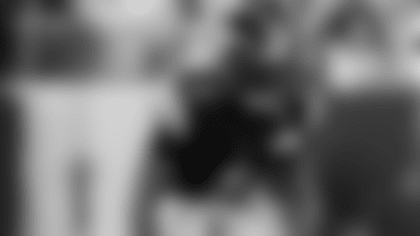Q. What were you looking for from your team during this week leading up to the game against the Colts today?
A. One of the things I've been openly discussing with them all week is that I expect them to be themselves, but I expect them to be their best selves. And I went further in defining that. In order for us to be our best selves, we have to be on the details as it pertains to our jobs, both players and coaches. The next thing is communication. Often times when you're faced with adversity, communication wanes, people get isolated. We need to do a good job of over-communicating this week – coach-to-coach, coach-to-player, player-to-player. And so we focused on details relative to our jobs, and communication, and the creation of good days. We felt like if we did the first two, it would produce the third and that would lead us to a good preparation week and thus the type of performance that we need.
Q. Did you know about the plan for the players' meeting that was called by Ben Roethlisberger, and what did you think about it when you did learn about it?
A. I didn't know about it, and to be honest with you I didn't ask a lot about it. It is what it is. It's a players' meeting, and so I'm sure they discussed some things that would align with my mentality in terms of us doing what we need to do to win this week, so I didn't need a lot of information. I don't micromanage everything, particularly when you know you have solid guys in leadership positions.
Q. Can players' meetings be effective?
A. They can't hurt. I don't know if you're expecting a parting of the Red Sea or what have you, but usually they provide an atmosphere where sincere thoughts and feelings get an opportunity to be expressed, and that's never a negative thing.
Q. There are some pedigreed, high-salaried players on your offensive line. Is that group underachieving, in your opinion?
A. In some instances, yes. But in some instances, I understand their work is a collective and at times we've missed some significant bodies and not only the significant bodies but those who back them up. A week ago, we were essentially playing with our third left guard, because Kevin Dotson, our swing guard, was unavailable to us as was Matt Feiler. There are ramifications to that, there are alterations of plan because of that from time to time, and that affects the overall quality of the collective. But the bottom line is the bottom line, and we have to play better. However you cut it, there are reasons, there are excuses. We need to play better than we've played, particularly in recent weeks.
Q. I understand you're not going to make excuses because of the limitations based on the COVID protocols, but in talking about the offensive line as a collective, is it a group that's hurt more by not being able to be in the same room together day after day and week after week over the course of a season?
A. That group and the secondary, and not only for our team but I would imagine for all teams. So those challenges are fair ones, and relatively we should be performing better than we are.
Q. If a lineup change is made at the NFL level that's performance based, is it more about the guy who has the job doing things to lose it, or about the guy who's a backup doing things to take it?
A. It's more about the guy who's doing things to earn an increased role, from my perspective. One of the things when you're in my position you always better be aware of is the issue of guys ascending and guys descending. And probably more than descending, it's guys ascending. When a guy merits more playing time because of quality of play and consistency in that area, that's what I always have an eye for.
Q. In terms of making a change in personnel, are all positions considered equal, or are there any where you might be more reluctant to bench somebody and replace him with somebody else?
A. There is no cookie-cutter process in terms of making those kinds of decisions. There are some consistent variables that you weigh. I think any of those decisions depend on the people involved and particularly the quality of play of the people involved.
Q. What are some of the variables you weigh?
A. How cohesion is an element of play at that particular position, or not. If we're talking about a punter who also is the holder, for example, you might make a decision exclusively based on punting on the surface, but the snap-hold-kick relationship is one you respect, the cohesion there always becomes an element of the discussion. Offensive line play. Secondary play, especially at the communication positions. Safety. The things where the collective, or communication within the collective is paramount. Some of the singular positions that are more skill-based and work more independently, less so.
Q. Has Benny Snell done enough to start at running back?
A. He certainly has. He has done enough not only in recent weeks but just in the larger body of work. That development was slowed there because he was putting the ball on the ground some at one point in the season, but just in general the overall arrow of the trajectory of his play has been an upward one, and he has merited more playing time, and he'll get more playing time because of it.
Q. What are the elements that make a gadget play effective?
A. The element of surprise. Usually, a mis-direction element of play, something where someone is in visual or responsibility conflict, as I call it, and where you're stretching the field both vertically and horizontally. I think that those are the basic principles of a quality gadget play that's capable of producing a big chunk of yards.
Q. As a tactic, what is your opinion of gadget plays by your offense?
A. I'm a proponent of it. I don't live in my fear. I think there needs to be a fundamental element of it that reduces the potential for negativity, but you can't live in your fears and seek victory. We have to take calculated risks in the pursuit of victory, and so I've always got an eye for that.
Q. What was it that ultimately led you to decide to talk to JuJu Smith-Schuster about dancing on the opponent's logo during pregame?
A. The fact I was getting asked about it, and it's as simple as that. We're trying to win a football game, and I don't have time for B.S., to be quite honest with you. If any moment of my day is wasted answering Tik-Tok questions, I don't have time for that.
Q. The Colts are considered to have one of the top offensive lines in football. How does an opponent go about trying to combat or minimize a top-notch offensive line?
A. I believe we have one of the best defensive fronts in football, and so I don't spend a lot of time being concerned about what we're going to do to combat someone's offensive line. I would imagine people spend a lot of time trying to figure out how they're going to try to combat our (defensive front). That's just the "hunt mentality" of defensive play that not only should permeate your locker room but also should be in the minds of your defensive coaching staff. We just don't live in our fears in that regard. We're an attack group. We feel like we've got quality players, and so that's our mentality.
Q. Is it as simple as winning one-on-one battles?
A. It starts there. If you can block Cam Heyward and Stephon Tuitt with one guy on each, then you have a chance to have a pretty good day, but I don't know that I've seen a lot of that over the years that I have worked with those two.
Q. Phillip Rivers is 39 years old, and you've had several matchups against him when he was with the Chargers. How has he responded to the change of scenery with his move to the Colts?
A. More than anything, the change of scenery has responded to him. And often that's the case when you're doing business with a grizzly, veteran quarterback like him. When Peyton Manning went to Denver, so did Peyton Manning's kind of offense. And as I look at things that Indianapolis is doing, there's no question I'm seeing some carryover from a year ago but I'm also seeing some things that are very much Philip Rivers. That's not a surprise either. That's why you do business with him. You want to make him comfortable. You want to work in his comfort zone and highlight his talents, not only his physical talents but also his intellectual talents. So I see some latitude at the line of scrimmage that he has that you didn't necessarily see Jacoby Brissett or Brian Hoyer have from a year ago, and so you have to respect that as well.
Q. In 238 NFL starts, Rivers has thrown 207 interceptions. What's your message to your defensive backs when they're going up against a guy like this?
A. I'm not concerned about the number of opportunities we get. I just want to make sure we don't miss opportunities. When you're playing a guy like him, there are consequences for missed opportunities, and that's what you preach to your guys. You don't control the number of opportunities you get in a game. He could be prudent in his attacking of the defense in a particular moment in a game and be thoughtful and choose to throw the ball away or take a sack. The bottom line is that if you get an opportunity to impact the game in a turnover kind of way, if you get your hands on a Philip Rivers ball, you better catch it. Because if you don't, there are consequences of that. Last year when we played the Chargers, we had an opportunity to get our hands on some and we did, and so we were able to be successful. But if you don't catch those balls, guys like Philip Rivers, guys like Ben and Drew Brees who have been doing it a while, if you give them a second chance, they're going to get you.














